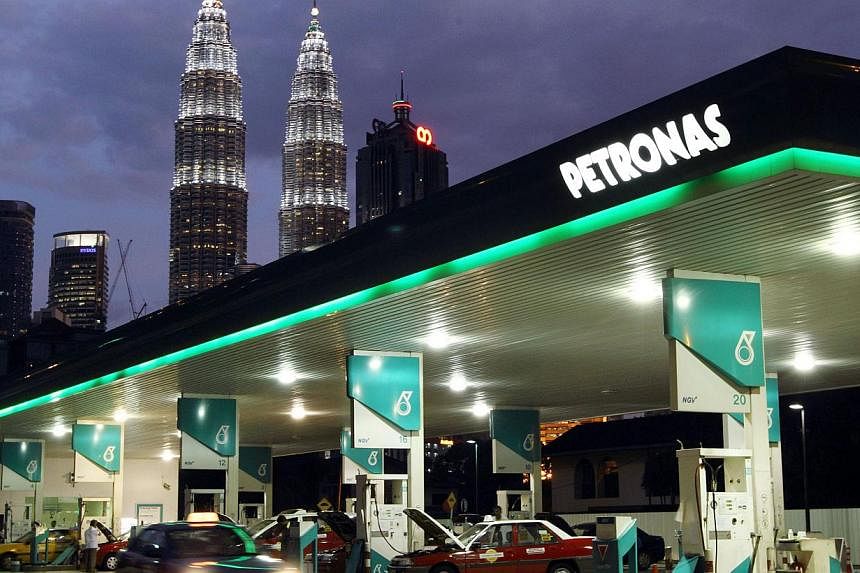SINGAPORE (Bloomberg) - Malaysian company dollar bonds are Asia's poorest performing this year and investors say worse is to come.
Notes from the oil-exporting nation are the only of the 16 Asian countries tracked by JPMorgan Chase to decline this year, losing 1.57 per cent. Companies in the index include Petroliam Nasional Petronas), the state-owned energy company, and 1Malaysia Development (1MDB), a government-backed investment firm that's been forced to dismantle amid surging debts.
Money managers from Invesco to One Asia Investment Partners cite factors ranging from a 13 per cent fall in the Malaysian ringgit in the last six months to a 47 per cent slump in oil over the same period, and debt repayment concerns at 1MDB as weighing on the nation's debt. They say the notes are not yet a buying opportunity amid sustained weakness in the currency, which on Monday tumbled 0.8 per cent.
"We're bearish on Malaysia dollar bonds and the ringgit," Mr Ken Hu, the Hong Kong-based chief investment officer for Asia-Pacific fixed income at Invesco, said on March 5. "Most other Asian countries are energy importers benefiting from lower oil prices. Malaysia is an energy exporter."
Oil-related industries comprise as much as 15 per cent of Malaysia's gross domestic product, according to Moody's Investors Service. Policy makers cut the country's growth forecasts and budget deficit target in January in response to the drop in crude prices driven by a global supply glut.
US oil producers are spending less, idling rigs and delaying wells to stem output that's predicted to reach a four- decade high this year. That's having little effect so far, with the nation's crude inventories expanding by 10.3 million barrels in the week ended Feb 27, the most since 2001.
Malaysia is the second-largest oil and natural gas producer in South-east Asia and the world's second-biggest exporter of liquefied natural gas, according to the US Energy Information Administration. LNG revenues are responsible for 2.7 per cent of Malaysia's GDP, World Bank data show.
"The soft crude oil prices are negative to Malaysia's trade and fiscal balances," said Mr Hu. "If crude oil prices stay low, liquid natural gas prices will likely follow."
The ringgit slid to a six-year low versus the US dollar on Monday after US job data hardened speculation the Federal Reserve will lift interest rates by the end of June. The yield on 10-year notes rose three basis points, or 0.03 percentage point, to 3.95 per cent, the highest since Jan 22.
Malaysia's credit rating could face "downward pressure" in the next two years if its current account deteriorates, according to Mr Tse Chern Chia, the Singapore-based head of Asia fixed income at UOB Asset Management. Malaysia's sovereign debt is scored A- by Standard & Poor's and Fitch Ratings.
"The ringgit has done poorly and the country is facing some structural issues," Mr Chia said in a March 9 interview. "Despite this, the few Malaysian companies in the JPMorgan index are generally very strong."
Moody's has a positive outlook on the nation, which it scores at A3. While crude, LNG and petroleum products accounted for about 20 per cent of exports in January, electronics made up 34 per cent, government data show. The currency drop should help boost sales of local products, the ratings said.
"Malaysia is actually a diversified economy," Mr Christian de Guzman, a sovereign analyst at Moody's in Singapore, said by phone March 3. "It's the country in Asia most exposed to oil prices, but the government had an appropriate response to the drop in commodities and is controlling its budget."
State-backed investment firm 1MDB, set up by the government five years ago to build infrastructure with borrowed money, flirted with default earlier this year after delaying payment on a RM2 billion loan. The company plans to break up its assets after drawing political criticism.
The yield on the fund's bonds due 2023 has risen 197 basis points this year, the worst performing of all dollar notes rated A- by S&P in Asia Pacific.
The political noise surrounding 1MDB and the pressure on the trade situation, current account and fiscal position "have weighed heavily on market sentiment," said Mr Brayan Lai, head of research and a portfolio manager at One Asia Investment Partners in Singapore, which manages about US$200 million. "On an overall basis, excluding the idiosyncratic risks tied to 1MDB, we are mindful of Malaysian risk in general."
1MDB's woes have hurt other government-related dollar bonds, including those of Petronas, which is the second worst performer in its rating category. The yield premium on Petronas 2022 debt over Treasuries has surged more than 50 basis points in the last six months after the government said it wasn't liable for 1MDB's debt and the fund missed a loan payment.
"There's less appetite for Malaysian bonds because of the cascading negative halo effect from 1MDB," Mr James Lau, an investment director at Pheim Asset Management Asia in Kuala Lumpur, said in a Jan 6 phone interview. "I wish this thing could disappear tomorrow."

